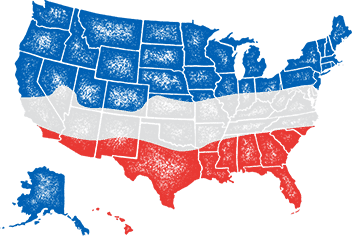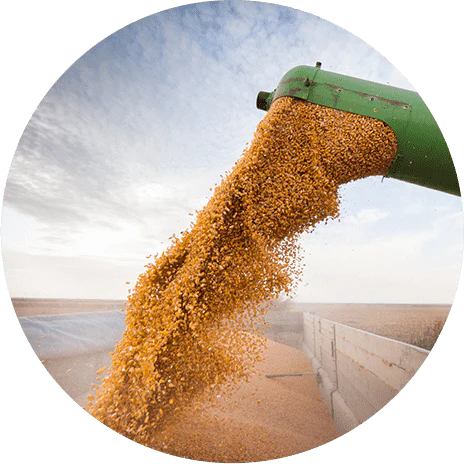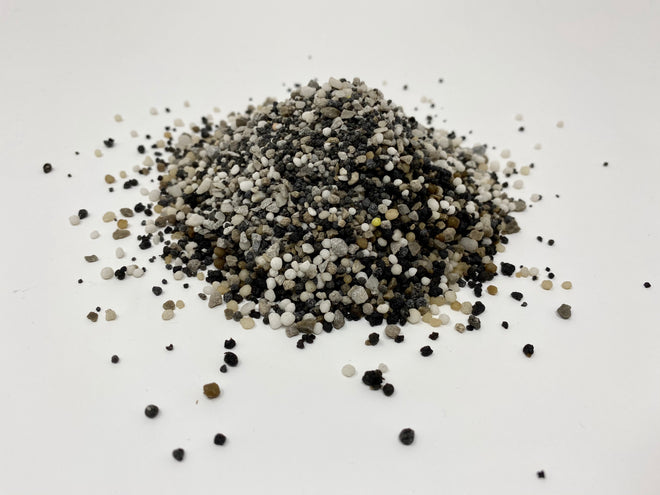
- When to plant:
- Spring, Summer
- Fertilizer:
- Hancock's 16-04-08 Lawn & Pasture Fertilizer
- Seeding rate:
- 15 lbs. per acre
- Overseeding rate:
- 12 lbs. per acre
- Seeding depth:
- 1/8 - 1/4 inch
- Ideal ph:
- 5.5 - 7.0
- Gmo:
- No
- Inoculant needed:
- No
- Coated or raw:
- Raw
- Lifecycle:
- Perennial
- Climate zones:
- Transition Zone, Warm Season
Morhay has earned its name by consistently providing among the highest yields for farmers and ranchers looking to cultivate feed for their animals. Part of this is thanks to the large size of its source Giant Bermuda Grass, but most is thanks to its high tolerance and rapid spreading.
Product Information
- Application or Use: Pasture, Cattle Grazing, Livestock Forage, Cover Crop, Hay Production
- Germination Time: 5 - 12 days, under optimal conditions
- Growing Locations: Warm Season & Transition Zone
- Height: Grazing or Hay Cutting, 8 - 10 inches
- Sunlight Requirements: 8+ hours, full sun for best results
- Advantages: Perfect blend of Bermuda varieties, offering an extremely heat and drought tolerant, deep-rooted, high quality forage.
- When to Plant: Recommended planting time is spring and summer when nighttime temperatures are consistently 65+ degrees and 3 months prior to first frost.
Product Details
- Dark green color
- Drought resistant
- High yields
- Durable, rapid spreading
- Heat tolerant
Product Information
Morhay Bermuda Grass Seed is a blend of warm-season, deep-rooted, perennial forage Bermuda Grass varieties used for pasture grazing and hay production across the southern United States. Morhay Bermuda Grass is adapted to a variety of soils and provides as much or more grazing than any other Bermuda pasture grass varieties. Morhay Bermuda grass is the easiest of all the Bermuda pasture grass varieties to manage and it responds well to fertilizer and weed control programs.
This variety is durable, being both heat and drought resistant, with a dark green color. It is rapid-spreading and grows densely. Morhay Bermuda Grass Seed is both economical and low maintenance. Don't think that this detracts from its high yields, however! Once established, a Morhay pasture can produce three tons of hay per acre with little moisture. With sub-moisture or irrigation, the production output could double.
Morhay Bermuda grass seed blend is a formulated mixture of Giant Bermuda grass seed and other forage type Bermuda grass seed varieties.
*Product packaging may appear different than what is pictured.
When planting warm season perennials on clay or tight soils low in organic matter, deep disc or chisel in late summer or early fall (September through October). Allow late fall or early spring rains to firm the soil. Cultivate the seed very shallow to stay weed-free until planting. Plant in late March or April (if there is no chance of a freeze and soil temperatures are above 65 degrees).
Seed at a rate of 15 to 20 lbs. per acre. Plant seed in a small, shallow furrow about 1/4 inch in contact with firm soil below the seed. Roll or pack after planting. If soil is loose, pack before planting, and again after planting for best results. Early growth of seedlings is slow until roots are established. Control weeds and other crop volunteers so that young seedlings have full exposure to sunlight.
A well-managed pasture of Morhay can use up to 100 to 200 lbs. of actual nitrogen per acre during the growing season for good yields. For best results, fertilizer should be applied two or three times during the growing season. On heavier soils, soil compaction usually occurs. This can be controlled with spring renovation every three or four years with the incorporation of high amounts of phosphate, potash or lime, according to the soil test. This will help promote healthy root development.
Morhay pastures will persist under continuous grazing, but you can get much more grazing per acre with the same amount of fertilizer if your pastures are cross-fenced. For best results, try to provide at least three pastures, and rotate cattle from one pasture to another on approximately 10-day intervals. This means each pasture will get about 20 days rest between grazings. Use a grazing pressure of about 3 to 4 cows per acre to determine the size of the Morhay pastures. Young leafy Bermuda grass has the highest feed value, so rotate animals to pasture when new growth reaches 3 to 5 inches tall.
Dragging pastures with a chain link harrow at least once per year will help to spread manure droppings, which reduces the parasite populations by exposing them to the air and sunlight. Dragging also helps to smooth areas where holes are created by hooves on wet soil.
Pasture growth will slow as temperatures cool off in the fall. It will go dormant after the first frost. Many annual cool season crops can be grown in a dormant Morhay pasture. Crops like TYFON (forage brassica) give earlier fall grazing, and Berseem clover or vetches will give late winter and early spring grazing. There are other clovers that work well depending on soil type.
Experience has shown that when the above suggestions are followed and good rains favor, good stands can be expected, and high yields will follow.
A winter pasture blend consisting of cool season grains, ryegrasses, or clover is often planted in October or November when the Bermuda grass goes dormant and remains unproductive until the following spring growing season. The best method for overseeding winter forage seed into dormant Morhay Bermuda Grass sod is to drill the seed directly into very short Bermuda stubble with no cultivation. Regardless of which method you choose for overseeding into the Bermuda grass, keep in mind that land preparation should be limited to as little as possible to reduce damage to the dormant Bermuda grass.
For best results, please review our Planting Guide and the specific product description before planting. Each product has recommended planting methods, timing, and seeding rates that are important for successful establishment. Following these guidelines will help ensure optimal performance and stand success.

Seed Quality
Hancock Seed is dedicated to delivering the best seeds possible to our customers. Hancock Seed grows and harvests many of our products, and we acquire the majority of the rest from other family farmers.
All these seeds are processed, packaged and shipped from Hancock Farm. This helps us ensure that our high standards are met. Unlike much of the competition, we refuse to sell you a seed that was not gathered during the last harvest. You will always receive fresh product from Hancock.
Every seed we grow comes with 40 years of experience behind it...you can rest assured that all of our products are cultivated in a method that assures its potential for growth.

Your cart ( 0 )

Morhay has earned its name by consistently providing among the highest yields for farmers and ranchers looking to cultivate feed for their animals. Part of this is thanks to the large size of its source Giant Bermuda Grass, but most is thanks to its high tolerance and rapid spreading.
Product Information
- Application or Use: Pasture, Cattle Grazing, Livestock Forage, Cover Crop, Hay Production
- Germination Time: 5 - 12 days, under optimal conditions
- Growing Locations: Warm Season & Transition Zone
- Height: Grazing or Hay Cutting, 8 - 10 inches
- Sunlight Requirements: 8+ hours, full sun for best results
- Advantages: Perfect blend of Bermuda varieties, offering an extremely heat and drought tolerant, deep-rooted, high quality forage.
- When to Plant: Recommended planting time is spring and summer when nighttime temperatures are consistently 65+ degrees and 3 months prior to first frost.
Product Details
- Dark green color
- Drought resistant
- High yields
- Durable, rapid spreading
- Heat tolerant
Product Information
Morhay Bermuda Grass Seed is a blend of warm-season, deep-rooted, perennial forage Bermuda Grass varieties used for pasture grazing and hay production across the southern United States. Morhay Bermuda Grass is adapted to a variety of soils and provides as much or more grazing than any other Bermuda pasture grass varieties. Morhay Bermuda grass is the easiest of all the Bermuda pasture grass varieties to manage and it responds well to fertilizer and weed control programs.
This variety is durable, being both heat and drought resistant, with a dark green color. It is rapid-spreading and grows densely. Morhay Bermuda Grass Seed is both economical and low maintenance. Don't think that this detracts from its high yields, however! Once established, a Morhay pasture can produce three tons of hay per acre with little moisture. With sub-moisture or irrigation, the production output could double.
Morhay Bermuda grass seed blend is a formulated mixture of Giant Bermuda grass seed and other forage type Bermuda grass seed varieties.
*Product packaging may appear different than what is pictured.
When planting warm season perennials on clay or tight soils low in organic matter, deep disc or chisel in late summer or early fall (September through October). Allow late fall or early spring rains to firm the soil. Cultivate the seed very shallow to stay weed-free until planting. Plant in late March or April (if there is no chance of a freeze and soil temperatures are above 65 degrees).
Seed at a rate of 15 to 20 lbs. per acre. Plant seed in a small, shallow furrow about 1/4 inch in contact with firm soil below the seed. Roll or pack after planting. If soil is loose, pack before planting, and again after planting for best results. Early growth of seedlings is slow until roots are established. Control weeds and other crop volunteers so that young seedlings have full exposure to sunlight.
A well-managed pasture of Morhay can use up to 100 to 200 lbs. of actual nitrogen per acre during the growing season for good yields. For best results, fertilizer should be applied two or three times during the growing season. On heavier soils, soil compaction usually occurs. This can be controlled with spring renovation every three or four years with the incorporation of high amounts of phosphate, potash or lime, according to the soil test. This will help promote healthy root development.
Morhay pastures will persist under continuous grazing, but you can get much more grazing per acre with the same amount of fertilizer if your pastures are cross-fenced. For best results, try to provide at least three pastures, and rotate cattle from one pasture to another on approximately 10-day intervals. This means each pasture will get about 20 days rest between grazings. Use a grazing pressure of about 3 to 4 cows per acre to determine the size of the Morhay pastures. Young leafy Bermuda grass has the highest feed value, so rotate animals to pasture when new growth reaches 3 to 5 inches tall.
Dragging pastures with a chain link harrow at least once per year will help to spread manure droppings, which reduces the parasite populations by exposing them to the air and sunlight. Dragging also helps to smooth areas where holes are created by hooves on wet soil.
Pasture growth will slow as temperatures cool off in the fall. It will go dormant after the first frost. Many annual cool season crops can be grown in a dormant Morhay pasture. Crops like TYFON (forage brassica) give earlier fall grazing, and Berseem clover or vetches will give late winter and early spring grazing. There are other clovers that work well depending on soil type.
Experience has shown that when the above suggestions are followed and good rains favor, good stands can be expected, and high yields will follow.
A winter pasture blend consisting of cool season grains, ryegrasses, or clover is often planted in October or November when the Bermuda grass goes dormant and remains unproductive until the following spring growing season. The best method for overseeding winter forage seed into dormant Morhay Bermuda Grass sod is to drill the seed directly into very short Bermuda stubble with no cultivation. Regardless of which method you choose for overseeding into the Bermuda grass, keep in mind that land preparation should be limited to as little as possible to reduce damage to the dormant Bermuda grass.
Instructions
For best results, please review our Planting Guide and the specific product description before planting. Each product has recommended planting methods, timing, and seeding rates that are important for successful establishment. Following these guidelines will help ensure optimal performance and stand success.

















